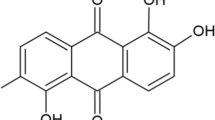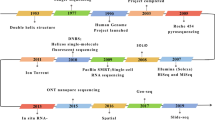Abstract
Breast cancer arises through the accumulation of multiple genetic alterations and epigenetic changes such as methylation, which silences gene expression in a variety of cancers. In the present study, we applied genomic screening to identify genes upregulated by the demethylating agent 5-aza-2′-deoxycytidine (DAC) in a human breast cancer cell line (MCF7). We identified 288 genes upregulated and 29 genes downregulated more than fivefold after treatment with DAC, and gene ontology analyses revealed the genes to be involved in immune responses, apoptosis, and cell differentiation. In addition, real-time PCR analysis of ten genes silenced in MCF7 cells confirmed that they are upregulated by DAC, while bisulfite-pyrosequencing analysis confirmed that nine of those genes were silenced by methylation. We also found that treating MCF7 cells with DAC restored induction of DFNA5 by p53, as well as by two other p53 family genes, p63γ and p73β. Introduction of NTN4 into MCF7 cells suppressed cell growth, indicating that NTN4 has tumor suppressive activity. In primary breast cancers, we detected cancer-specific methylation of NTN4, PGP9.5, and DKK3, suggesting that methylation of these genes could be useful markers for diagnosis of breast cancer. Thus, DNA methylation appears to be a common event in breast cancer, and the genes silenced by methylation could be useful targets for both diagnosis and therapy.







Similar content being viewed by others
References
Bird A (1992) The essentials of DNA methylation. Cell 70:5–8
Jones PA, Baylin SB (2007) The epigenomics of cancer. Cell 128:683–692
Jemal A, Siegel R, Ward E et al (2008) Cancer statistics, 2008. CA Cancer J Clin 58:71–96
Schuebel KE, Chen W, Cope L et al (2007) Comparing the DNA hypermethylome with gene mutations in human colorectal cancer. PLoS Genet 3:1709–1723
Herman JG, Merlo A, Mao L et al (1995) Inactivation of the CDKN2/p16/MTS1 gene is frequently associated with aberrant DNA methylation in all common human cancers. Cancer Res 55:4525–4530
Ferguson AT, Evron E, Umbricht CB et al (2000) High frequency of hypermethylation at the 14-3-3 sigma locus leads to gene silencing in breast cancer. Proc Natl Acad Sci USA 97:6049–6054
Graff JR, Herman JG, Lapidus RG et al (1995) E-cadherin expression is silenced by DNA hypermethylation in human breast and prostate carcinomas. Cancer Res 55:5195–5199
Krop IE, Sgroi D, Porter DA et al (2001) HIN-1, a putative cytokine highly expressed in normal but not cancerous mammary epithelial cells. Proc Natl Acad Sci USA 98:9796–9801
Dammann R, Yang G, Pfeifer GP (2001) Hypermethylation of the cpG island of Ras association domain family 1A (RASSF1A), a putative tumor suppressor gene from the 3p21.3 locus, occurs in a large percentage of human breast cancers. Cancer Res 61:3105–3109
Conway KE, McConnell BB, Bowring CE et al (2000) TMS1, a novel proapoptotic caspase recruitment domain protein, is a target of methylation-induced gene silencing in human breast cancers. Cancer Res 60:6236–6242
Rodriguez BA, Cheng AS, Yan PS et al (2008) Epigenetic repression of the estrogen-regulated Homeobox B13 gene in breast cancer. Carcinogenesis 29:1459–1465
Douglas DB, Akiyama Y, Carraway H et al (2004) Hypermethylation of a small CpGuanine-rich region correlates with loss of activator protein-2alpha expression during progression of breast cancer. Cancer Res 64:1611–1620
Chung W, Kwabi-Addo B, Ittmann M et al (2008) Identification of novel tumor markers in prostate, colon and breast cancer by unbiased methylation profiling. PLoS One 3:e2079
Ostrow KL, Park HL, Hoque MO et al (2009) Pharmacologic unmasking of epigenetically silenced genes in breast cancer. Clin Cancer Res 15:1184–1191
Tommasi S, Karm DL, Wu X et al (2009) Methylation of homeobox genes is a frequent and early epigenetic event in breast cancer. Breast Cancer Res 11:R14
Gardiner-Garden M, Frommer M (1987) CpG islands in vertebrate genomes. J Mol Biol 196:261–282
Clark SJ, Harrison J, Paul CL et al (1994) High sensitivity mapping of methylated cytosines. Nucleic Acids Res 22:2990–2997
Watanabe Y, Toyota M, Kondo Y et al (2007) PRDM5 identified as a target of epigenetic silencing in colorectal and gastric cancer. Clin Cancer Res 13:4786–4794
Yang AS, Estecio MR, Doshi K et al (2004) A simple method for estimating global DNA methylation using bisulfite PCR of repetitive DNA elements. Nucleic Acids Res 32:e38
Sasaki Y, Morimoto I, Ishida S et al (2001) Adenovirus-mediated transfer of the p53 family genes, p73 and p51/p63 induces cell cycle arrest and apoptosis in colorectal cancer cell lines: potential application to gene therapy of colorectal cancer. Gene Ther 8:1401–1408
Sasaki Y, Negishi H, Koyama R et al (2009) p53 family members regulate the expression of the apolipoprotein D gene. J Biol Chem 284:872–883
Suzuki H, Igarashi S, Nojima M et al (2009) IGFBP7 is a p53 responsive gene specifically silenced in colorectal cancer with CpG island methylator phenotype. Carcinogenesis. doi:10.1093/carcin/bgp179
Kim MS, Lebron C, Nagpal JK et al (2008) Methylation of the DFNA5 increases risk of lymph node metastasis in human breast cancer. Biochem Biophys Res Commun 370:38–43
Veeck J, Bektas N, Hartmann A et al (2008) Wnt signalling in human breast cancer: expression of the putative Wnt inhibitor Dickkopf-3 (DKK3) is frequently suppressed by promoter hypermethylation in mammary tumours. Breast Cancer Res 10:R82
Veeck J, Niederacher D, An H et al (2006) Aberrant methylation of the Wnt antagonist SFRP1 in breast cancer is associated with unfavourable prognosis. Oncogene 25:3479–3488
Akino K, Toyota M, Suzuki H et al (2007) Identification of DFNA5 as a target of epigenetic inactivation in gastric cancer. Cancer Sci 98:88–95
Mandelker DL, Yamashita K, Tokumaru Y et al (2005) PGP9.5 promoter methylation is an independent prognostic factor for esophageal squamous cell carcinoma. Cancer Res 65:4963–4968
Sato H, Suzuki H, Toyota M et al (2007) Frequent epigenetic inactivation of DICKKOPF family genes in human gastrointestinal tumors. Carcinogenesis 28:2459–2466
Suzuki H, Watkins DN, Jair KW et al (2004) Epigenetic inactivation of SFRP genes allows constitutive WNT signaling in colorectal cancer. Nat Genet 36:417–422
Wu G, Guo Z, Chang X et al (2007) LOXL1 and LOXL4 are epigenetically silenced and can inhibit ras/extracellular signal-regulated kinase signaling pathway in human bladder cancer. Cancer Res 67:4123–4129
Lejmi E, Leconte L, Pedron-Mazoyer S et al (2008) Netrin-4 inhibits angiogenesis via binding to neogenin and recruitment of Unc5B. Proc Natl Acad Sci USA 105:12491–12496
Micale L, Fusco C, Augello B et al (2008) Williams-Beuren syndrome TRIM50 encodes an E3 ubiquitin ligase. Eur J Hum Genet 16:1038–1049
Crackower MA, Kolas NK, Noguchi J et al (2003) Essential role of Fkbp6 in male fertility and homologous chromosome pairing in meiosis. Science 300:1291–1295
Marchesani M, Hakkarainen A, Tuomainen TP et al (2003) New paraoxonase 1 polymorphism I102V and the risk of prostate cancer in Finnish men. J Natl Cancer Inst 95:812–818
Lehto M, Mayranpaa MI, Pellinen T et al (2008) The R-Ras interaction partner ORP3 regulates cell adhesion. J Cell Sci 121:695–705
Masuda Y, Futamura M, Kamino H et al (2006) The potential role of DFNA5, a hearing impairment gene, in p53-mediated cellular response to DNA damage. J Hum Genet 51:652–664
Arakawa H (2004) Netrin-1 and its receptors in tumorigenesis. Nat Rev Cancer 4:978–987
Suzuki H, Toyota M, Carraway H et al (2008) Frequent epigenetic inactivation of Wnt antagonist genes in breast cancer. Br J Cancer 98:1147–1156
Tokumaru Y, Yamashita K, Kim MS et al (2008) The role of PGP9.5 as a tumor suppressor gene in human cancer. Int J Cancer 123:753–759
Yamashita K, Park HL, Kim MS et al (2006) PGP9.5 methylation in diffuse-type gastric cancer. Cancer Res 66:3921–3927
Karpf AR, Peterson PW, Rawlins JT et al (1999) Inhibition of DNA methyltransferase stimulates the expression of signal transducer and activator of transcription 1, 2, and 3 genes in colon tumor cells. Proc Natl Acad Sci USA 96:14007–14012
Issa JP, Ahuja N, Toyota M et al (2001) Accelerated age-related CpG island methylation in ulcerative colitis. Cancer Res 61:3573–3577
Kwabi-Addo B, Chung W, Shen L et al (2007) Age-related DNA methylation changes in normal human prostate tissues. Clin Cancer Res 13:3796–3802
Shen L, Toyota M, Kondo Y et al (2007) Integrated genetic and epigenetic analysis identifies three different subclasses of colon cancer. Proc Natl Acad Sci USA 104:18654–18659
Nojima M, Suzuki H, Toyota M et al (2007) Frequent epigenetic inactivation of SFRP genes and constitutive activation of Wnt signaling in gastric cancer. Oncogene 26:4699–4713
Rattner A, Hsieh JC, Smallwood PM et al (1997) A family of secreted proteins contains homology to the cysteine-rich ligand-binding domain of frizzled receptors. Proc Natl Acad Sci USA 94:2859–2863
Bafico A, Liu G, Goldin L et al (2004) An autocrine mechanism for constitutive Wnt pathway activation in human cancer cells. Cancer Cell 6:497–506
Schlosshauer PW, Brown SA, Eisinger K et al (2000) APC truncation and increased beta-catenin levels in a human breast cancer cell line. Carcinogenesis 21:1453–1456
Van Laer L, Huizing EH, Verstreken M et al (1998) Nonsyndromic hearing impairment is associated with a mutation in DFNA5. Nat Genet 20:194–197
Thompson DA, Weigel RJ (1998) Characterization of a gene that is inversely correlated with estrogen receptor expression (ICERE-1) in breast carcinomas. Eur J Biochem 252:169–177
Lage H, Helmbach H, Grottke C et al (2001) DFNA5 (ICERE-1) contributes to acquired etoposide resistance in melanoma cells. FEBS Lett 494:54–59
Esseghir S, Kennedy A, Seedhar P et al (2007) Identification of NTN4, TRA1, and STC2 as prognostic markers in breast cancer in a screen for signal sequence encoding proteins. Clin Cancer Res 13:3164–3173
Toyota M, Suzuki H, Yamashita T et al (2009) Cancer epigenomics: implications of DNA methylation in personalized cancer therapy. Cancer Sci 100:787–791
Meng X, Lu X, Morris CA et al (1998) A novel human gene FKBP6 is deleted in Williams syndrome. Genomics 52:130–137
Acknowledgments
The authors thank Dr. William F. Goldman for editing the manuscript. This study was supported in part by Grants-in-Aid for Scientific Research on Priority Areas from the Ministry of Education, Culture, Sports, Science, and Technology (K.I., T.T., and M.T.), Grants-in-Aid for Scientific Research (S) from Japan Society for Promotion of Science (K.I.), a Grant-in-Aid for the Third-term Comprehensive 10-year Strategy for Cancer Control, and Grant-in-Aid for Cancer Research from the Ministry of Health, Labor, and Welfare, Japan (M.T.).
Author information
Authors and Affiliations
Corresponding author
Additional information
Tomoko Fujikane, Noriko Nishikawa, Minoru Toyota, Hiromu Suzuki contributed equally to this work.
Electronic supplementary material
Below is the link to the electronic supplementary material.
Rights and permissions
About this article
Cite this article
Fujikane, T., Nishikawa, N., Toyota, M. et al. Genomic screening for genes upregulated by demethylation revealed novel targets of epigenetic silencing in breast cancer. Breast Cancer Res Treat 122, 699–710 (2010). https://doi.org/10.1007/s10549-009-0600-1
Received:
Accepted:
Published:
Issue Date:
DOI: https://doi.org/10.1007/s10549-009-0600-1




